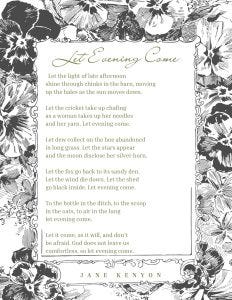Hello, Poetry Friend
Today’s post comes with a trigger warning: We will talk about depression. We will talk about it in the context of perhaps my favorite poet, Jane Kenyon, who writes about the subject with great tenderness and beauty. (Her birthday was yesterday, May 23.)
Refusal of the Call
We have so many excellent reasons for saying no to the call. Adventure is messy, dangerous, and does not come with guaranteed outcomes. It makes us feel unpleasant emotions. Just to think about the enormity of it can incite depression, and that’s before we screw up.
Motherhood Depression
In the decades since I became a mother, we’ve learned a lot about depression, and yet there is much we still do not know. When I struggled with postpartum depression, I recognized the signs and got help. I was less able to recognize it in my child, especially when it took different forms than in me, an adult.
I remember a kindergarten teacher coming to me with concerns about my child. We agreed a visit to the school counselor was in order. Unfortunately, that particular educator was not equipped to recognize severe depression any more than I was, and she gave trite, unhelpful advice. I should have sought out a professional. I did not.
It’s like I answered the phone , but then didn’t speak. Eventually the caller hung up. The depression did not go away.
Just like it didn’t for Jane Kenyon. But she kept writing.
“Let Evening Come,” by Jane Kenyon
Kenyon might be my favorite poet. She died at age 47 from leukemia, but her poems are written in the context of the depression she carried throughout her life. (Listen to “Evening Sun” to get a sense of how far back it goes.)
There are many ways to read “Let Evening Come,” but for our Hero's Poetry Journey, I am letting “evening” symbolize the call I want to refuse. The thing I don’t want to face because it’s scary and hard. But Kenyon writes so calmly about evening’s darkness, as calmly as the light moving up the barnyard bales as the sun moves down. She says:
Let it come, as it will, and don’t
be afraid.
Before you refuse the call, read Kenyon’s poem and picture each detail: the bales, the cricket, the hoe, the stars, the moon, the fox, the shed, the bottle, the scoop. We are not left "comfortless" as we prepare for departure.
Let Evening Come
Let the light of late afternoon
shine through chinks in the barn, moving
up the bales as the sun moves down.
Let the cricket take up chafing
as a woman takes up her needles
and her yarn. Let evening come.
Let dew collect on the hoe abandoned
in long grass. Let the stars appear
and the moon disclose her silver horn.
Let the fox go back to its sandy den.
Let the wind die down. Let the shed
go black inside. Let evening come.
To the bottle in the ditch, to the scoop
in the oats, to air in the lung
let evening come.
Let it come, as it will, and don’t
be afraid. God does not leave us
comfortless, so let evening come.
–Jane KenyonPoetry Journal
Read Kenyon’s poem. Jot down what you notice, what you like, what you don’t, what questions you have, and at least one way in which the poem speaks to your soul.
Write about a moment when you refused a call you should have taken. Or, like me, when you picked up the phone but didn’t speak.
Read Kenyon's poem aloud. Pick one phrase or line or stanza you can tuck deep in your heart.
Write your own haiku about this stage of your hero’s poetry journey. (Mine is at meganwillome.com.) If you like, email me what you write.
Happy Poeming!
Megan





